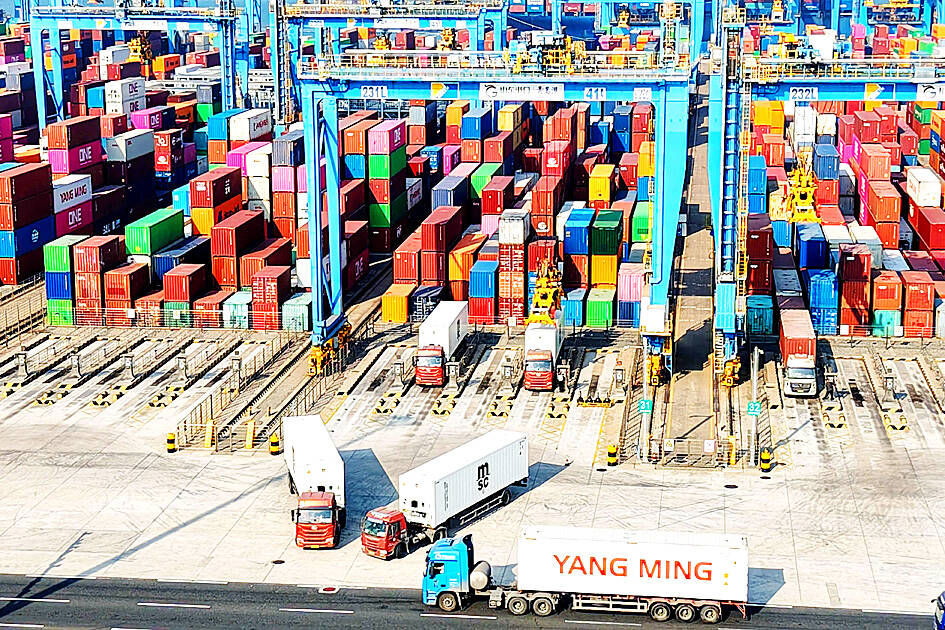China’s exports surged to a record high last year, providing a much-needed boost for the economy as the prospect of biting tariffs imposed by US president-elect Donald Trump looms.
“In 2024, China’s total exports exceeded 25 trillion yuan [US$3.41 trillion] for the first time, reaching 25.45 trillion yuan, an increase of 7.1 percent year-on-year,” Chinese General Administration of Customs spokesman Lu Daliang (呂大良) told a news conference in Beijing yesterday.
Total imports rose 2.3 percent to 18.39 trillion yuan, Lu added.

Photo: AFP
Combined trade expanded 5 percent to reach a record 43.85 trillion yuan, customs Vice Minister Wang Lingjun (王令浚) said.
“China’s position as the world’s largest goods trading nation has become even more secure,” Wang added.
Official customs data showed that exports last month jumped 10.7 percent year-on-year, comfortably outperforming a forecast of 7.5 percent in a Bloomberg survey of economists.
“We expect shipments to remain strong in the coming months, as US importers continue to stockpile Chinese goods ahead of tariff hikes,” Capital Economics Ltd economist Huang Zichun (黃子春) wrote in a note.
“But exports are likely to weaken later this year, as President Trump puts his tariff threats into action,” she added.
Imports last month grew 1 percent year-on-year, customs data showed, compared with a Bloomberg forecast of a 1 percent fall.
China’s exports “are likely to stay resilient in the near term,” Huang wrote.
“But outbound shipments will weaken later this year if Trump follows through,” she wrote, adding that the new US tariffs “could reduce export volumes by about three percent and shave roughly 0.5 percent off China’s GDP.”
During his presidential campaign, Trump threatened to slap a 60 percent tariff on all Chinese goods.
“With the help of strong exports and macro policy easing, the economic momentum likely stabilized,” Pinpoint Asset Management Ltd chief economist Zhang Zhiwei (張智威) wrote in a note yesterday following the publication of the trade figures.
The government is due to release last year’s economic growth data later this week. Chinese President Xi Jinping (習近平) on Dec. 31 expressed confidence that the country would meet its official economic growth target for last year of about 5 percent.

Taiwan Semiconductor Manufacturing Co (TSMC, 台積電) yesterday said that its investment plan in Arizona is going according to schedule, following a local media report claiming that the company is planning to break ground on its third wafer fab in the US in June. In a statement, TSMC said it does not comment on market speculation, but that its investments in Arizona are proceeding well. TSMC is investing more than US$65 billion in Arizona to build three advanced wafer fabs. The first one has started production using the 4-nanometer (nm) process, while the second one would start mass production using the

When an apartment comes up for rent in Germany’s big cities, hundreds of prospective tenants often queue down the street to view it, but the acute shortage of affordable housing is getting scant attention ahead of today’s snap general election. “Housing is one of the main problems for people, but nobody talks about it, nobody takes it seriously,” said Andreas Ibel, president of Build Europe, an association representing housing developers. Migration and the sluggish economy top the list of voters’ concerns, but analysts say housing policy fails to break through as returns on investment take time to register, making the

‘SILVER LINING’: Although the news caused TSMC to fall on the local market, an analyst said that as tariffs are not set to go into effect until April, there is still time for negotiations US President Donald Trump on Tuesday said that he would likely impose tariffs on semiconductor, automobile and pharmaceutical imports of about 25 percent, with an announcement coming as soon as April 2 in a move that would represent a dramatic widening of the US leader’s trade war. “I probably will tell you that on April 2, but it’ll be in the neighborhood of 25 percent,” Trump told reporters at his Mar-a-Lago club when asked about his plan for auto tariffs. Asked about similar levies on pharmaceutical drugs and semiconductors, the president said that “it’ll be 25 percent and higher, and it’ll

CHIP BOOM: Revenue for the semiconductor industry is set to reach US$1 trillion by 2032, opening up opportunities for the chip pacakging and testing company, it said ASE Technology Holding Co (日月光投控), the world’s largest provider of outsourced semiconductor assembly and test (OSAT) services, yesterday launched a new advanced manufacturing facility in Penang, Malaysia, aiming to meet growing demand for emerging technologies such as generative artificial intelligence (AI) applications. The US$300 million facility is a critical step in expanding ASE’s global footprint, offering an alternative for customers from the US, Europe, Japan, South Korea and China to assemble and test chips outside of Taiwan amid efforts to diversify supply chains. The plant, the company’s fifth in Malaysia, is part of a strategic expansion plan that would more than triple